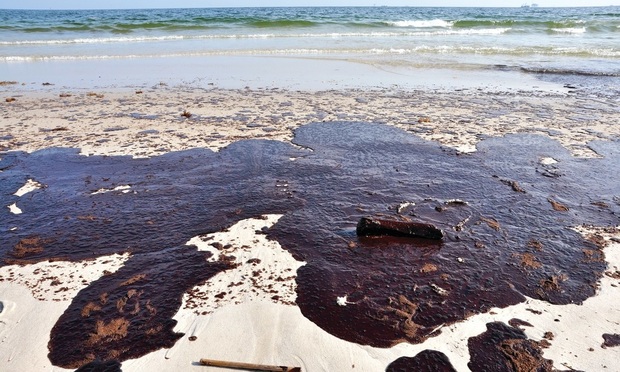Legal Departments Unprepared for New Oil Pollution Act Guidelines, Maritime Expert Says
Under the U.S. Coast Guard's new interpretation of the Oil Pollution Act of 1990, an array of industries operating cargo ships, oil tankers and other large vessels that visit U.S. ports must show they have specific plans and resources in place to quickly respond to oil spills and fires.
March 18, 2019 at 04:20 PM
4 minute read

Confusion over stricter new liability guidelines under the Oil Pollution Act of 1990 could create troubled waters for cruise lines, petroleum companies and an array of other businesses that qualify as owners or operators of tankers, cargo ships and other large vessels visiting U.S. ports, according to a maritime law expert.
Jonathan Gutoff, an admiralty law professor at the Roger Williams University School of Law in Rhode Island, asserts many owner-operators are in the dark about the new standards or mistakenly believe that they'll enjoy the same limited liability under a now-outdated interpretation of OPA.
Enacted in 1990 on the heels of the Exxon Valdez oil spill disaster in Alaska, the law affects “anyone who operates a vessel with petroleum as its cargo or its source of propulsion” and “imposes liability not just for direct property damage and personal injury but for all the economic consequences of the environmental damages,” Gutoff said.
For years, the Coast Guard has interpreted OPA as requiring operators to contract with so-called “vessels of opportunity” that agree to respond to oil spills and fires—but only if they happen to be in the area and available, Gutoff said. He asserted the interpretation was “legally incorrect.”
The Coast Guard changed its position late last year, when it announced that OPA requires companies responsible for ships to “ensure by contract or other approved means that response resources are available to respond” to incidents.
The new guidelines appear to torpedo the traditional response plans that relied on vessels of opportunity, which would mean that ship owners, operators and subcontractors can no longer argue that they are entitled to limited liability under OPA because they made a good faith effort to respond to a maritime disaster, even when no response resources were available.
Now, legal departments for affected companies need to review contracts with oil spill response providers and “make sure that whatever provider the business selects is actually able to point to particular marine firefighting and salvage assets that are in place and able to respond within the time limits set by the regulations,” Gutoff said.
He added the companies must also be able to identify those assets “and not simply say I promise to have necessary assets in place. You'd want to be able to point to particular vessels with firefighting capabilities and particular trained crew who had undergone regular firefighting drills.”
The new regulations haven't been tested in court. But Gutoff said if a company had a response plan that depended on vessels of opportunity and had an oil spill, “the proper legal result would be that they would not be able to limit their liability because they were out of compliance with the regulations.”
Proving limited liability for an oil spill was already difficult, according to John Giffin, the senior maritime shareholder in Keesal, Young & Logan's office in San Francisco. He has represented several oil companies in the wake of spills, including Cosco Busan's ship owner and manager after a 2007 oil spill in the San Francisco Bay.
“The government is very aggressive about challenging any attempt by a ship owner from limiting its liability under OPA,” Giffin said.
He added major oil companies operating in the Bay Area are likely prepared for the new regulations, because they “have been requiring that their response contractors conduct drills to make sure that they can respond timely under an oil spill.”
But that might not be the case in more remote areas where the resources that would be needed to respond to a major spill are scarce or nonexistent, according to Giffin. He cited the Lost Coast of Northern California as an example of an area that's unprepared.
“It is a problem up there,” he said. “We've been dealing with that for a number of years.”
This content has been archived. It is available through our partners, LexisNexis® and Bloomberg Law.
To view this content, please continue to their sites.
Not a Lexis Subscriber?
Subscribe Now
Not a Bloomberg Law Subscriber?
Subscribe Now
NOT FOR REPRINT
© 2025 ALM Global, LLC, All Rights Reserved. Request academic re-use from www.copyright.com. All other uses, submit a request to [email protected]. For more information visit Asset & Logo Licensing.
You Might Like
View All
NBA Players Association Finds Its New GC in Warriors Front Office



Trending Stories
- 1States Accuse Trump of Thwarting Court's Funding Restoration Order
- 2Microsoft Becomes Latest Tech Company to Face Claims of Stealing Marketing Commissions From Influencers
- 3Coral Gables Attorney Busted for Stalking Lawyer
- 4Trump's DOJ Delays Releasing Jan. 6 FBI Agents List Under Consent Order
- 5Securities Report Says That 2024 Settlements Passed a Total of $5.2B
Who Got The Work
J. Brugh Lower of Gibbons has entered an appearance for industrial equipment supplier Devco Corporation in a pending trademark infringement lawsuit. The suit, accusing the defendant of selling knock-off Graco products, was filed Dec. 18 in New Jersey District Court by Rivkin Radler on behalf of Graco Inc. and Graco Minnesota. The case, assigned to U.S. District Judge Zahid N. Quraishi, is 3:24-cv-11294, Graco Inc. et al v. Devco Corporation.
Who Got The Work
Rebecca Maller-Stein and Kent A. Yalowitz of Arnold & Porter Kaye Scholer have entered their appearances for Hanaco Venture Capital and its executives, Lior Prosor and David Frankel, in a pending securities lawsuit. The action, filed on Dec. 24 in New York Southern District Court by Zell, Aron & Co. on behalf of Goldeneye Advisors, accuses the defendants of negligently and fraudulently managing the plaintiff's $1 million investment. The case, assigned to U.S. District Judge Vernon S. Broderick, is 1:24-cv-09918, Goldeneye Advisors, LLC v. Hanaco Venture Capital, Ltd. et al.
Who Got The Work
Attorneys from A&O Shearman has stepped in as defense counsel for Toronto-Dominion Bank and other defendants in a pending securities class action. The suit, filed Dec. 11 in New York Southern District Court by Bleichmar Fonti & Auld, accuses the defendants of concealing the bank's 'pervasive' deficiencies in regards to its compliance with the Bank Secrecy Act and the quality of its anti-money laundering controls. The case, assigned to U.S. District Judge Arun Subramanian, is 1:24-cv-09445, Gonzalez v. The Toronto-Dominion Bank et al.
Who Got The Work
Crown Castle International, a Pennsylvania company providing shared communications infrastructure, has turned to Luke D. Wolf of Gordon Rees Scully Mansukhani to fend off a pending breach-of-contract lawsuit. The court action, filed Nov. 25 in Michigan Eastern District Court by Hooper Hathaway PC on behalf of The Town Residences LLC, accuses Crown Castle of failing to transfer approximately $30,000 in utility payments from T-Mobile in breach of a roof-top lease and assignment agreement. The case, assigned to U.S. District Judge Susan K. Declercq, is 2:24-cv-13131, The Town Residences LLC v. T-Mobile US, Inc. et al.
Who Got The Work
Wilfred P. Coronato and Daniel M. Schwartz of McCarter & English have stepped in as defense counsel to Electrolux Home Products Inc. in a pending product liability lawsuit. The court action, filed Nov. 26 in New York Eastern District Court by Poulos Lopiccolo PC and Nagel Rice LLP on behalf of David Stern, alleges that the defendant's refrigerators’ drawers and shelving repeatedly break and fall apart within months after purchase. The case, assigned to U.S. District Judge Joan M. Azrack, is 2:24-cv-08204, Stern v. Electrolux Home Products, Inc.
Featured Firms
Law Offices of Gary Martin Hays & Associates, P.C.
(470) 294-1674
Law Offices of Mark E. Salomone
(857) 444-6468
Smith & Hassler
(713) 739-1250






